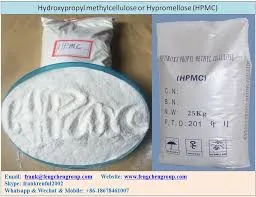
Oct . 18, 2024 21:53 Back to list
Hydroxyethylcellulose Benefits and Applications in Natural and Sustainable Products
Hydroxyethyl Cellulose A Natural Polymer with Versatile Applications
Hydroxyethyl cellulose (HEC) is a non-ionic, water-soluble polymer derived from cellulose, which is a natural polymer itself obtained from plant cell walls. HEC is widely recognized for its versatility and has found applications in various industries, including pharmaceuticals, cosmetics, food, and construction. What makes HEC particularly appealing is its natural origins and the fact that it is biodegradable, aligning with the increasing demand for environmentally friendly products.
Chemical Structure and Properties
HEC is formed by the etherification of cellulose with ethylene oxide, resulting in a product that exhibits enhanced solubility in water compared to its parent compound, cellulose. The degree of substitution can vary, which means that the properties of HEC can be tailored for specific applications. This polymer is characterized by its thickening, gelling, and stabilizing properties, making it a valuable ingredient in many formulations. HEC solutions are typically clear and possess a smooth texture, which is desirable in cosmetic and pharmaceutical applications.
Applications in Cosmetics and Personal Care
One of the most prominent uses of hydroxyethyl cellulose is in the cosmetic and personal care industry. It is commonly found in products such as shampoos, conditioners, lotions, gels, and creams. HEC acts as a thickening agent, improving the texture and consistency of formulations. Its ability to form stable emulsions is crucial in creams and lotions, ensuring that oil and water phases blend well without separating. Additionally, HEC is popular in hair care products for its film-forming properties, offering a smooth and shiny finish to hair without weighing it down.
Pharmaceutical Applications
In pharmaceuticals, hydroxyethyl cellulose is often utilized as a rheology modifier, binding agent, and stabilizer in various formulations, including tablets, gels, and suspensions. HEC enhances the viscosity of liquid formulations, aiding in the control of drug release profiles and ensuring a more consistent dosage. Its non-irritating nature makes it suitable for use in topical and ophthalmic preparations, providing a soothing effect while also improving product stability.
hydroxyethylcellulose natural

Food Industry Utilization
HEC also finds its place in the food industry as a food additive. It is used as a thickener, stabilizer, and emulsifier in various food products, including dressings, sauces, and baked goods. Its ability to retain moisture contributes to improved texture and shelf life, which is essential for food manufacturers aiming to enhance product quality while minimizing waste. Additionally, being a plant-derived product, HEC aligns with the growing trend towards natural and clean-label foods, appealing to health-conscious consumers.
Building and Construction Applications
The construction industry has adopted hydroxyethyl cellulose for its advantageous properties in mortars and coatings. HEC improves the workability and adhesion of cement-based products, making it easier to apply and enhancing the durability of structures. It also contributes to better water retention, allowing for improved curing of materials and reducing cracking, which is a common issue in construction.
Environmental Considerations
As a natural and biodegradable product, hydroxyethyl cellulose aligns well with the increasing emphasis on sustainability across various sectors. The shift towards natural ingredients in consumer products reflects a growing awareness of environmental impacts. HEC's ability to degrade in the environment without leaving harmful residues makes it an attractive option compared to synthetic polymers.
Conclusion
Hydroxyethyl cellulose is a remarkable natural polymer that plays a pivotal role in various industries due to its unique properties and versatility. Its applications in cosmetics, pharmaceuticals, food, and construction sectors underscore its importance as a multifunctional ingredient with a promising future. As consumers increasingly seek out natural and sustainable products, HEC stands out as a prime candidate, marrying functionality with eco-friendliness in today’s evolving market landscape.
-
Versatile Hpmc Uses in Different Industries
NewsJun.19,2025
-
Redispersible Powder's Role in Enhancing Durability of Construction Products
NewsJun.19,2025
-
Hydroxyethyl Cellulose Applications Driving Green Industrial Processes
NewsJun.19,2025
-
Exploring Different Redispersible Polymer Powder
NewsJun.19,2025
-
Choosing the Right Mortar Bonding Agent
NewsJun.19,2025
-
Applications and Significance of China Hpmc in Modern Industries
NewsJun.19,2025







